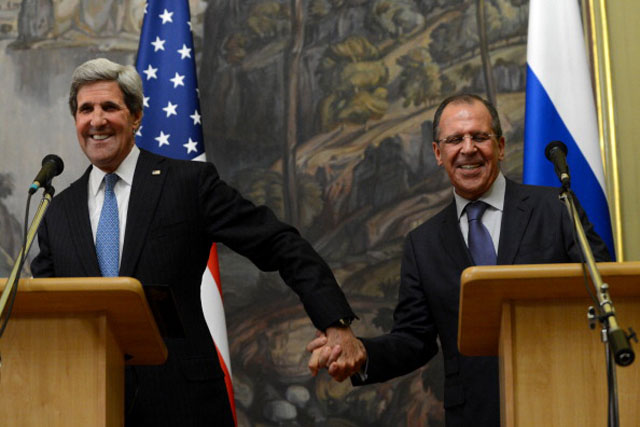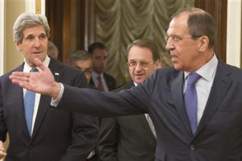
U.S. Secretary of State John Kerry and his Russian counterpart Sergei Lavrov speak at their joint press conference in Moscow on May 7. (Getty Images)
Secretary of State John Kerry today warned Russia that the United States opposes the sale of advanced surface-to-air missiles to Syrian government.
The Wall Street Journal reported Wednesday that Russia was preparing to transfer missiles to the Syrian government, according to Israeli intelligence. Russia is a longtime ally to President al-Assad’s regime.
Kerry spoke at a news conference today to declare the U.S.’ condemnation of such assistance:
We’ve made it crystal clear that we prefer that Russia would not supply them assistance. That is on record. That has not changed.
In Washington, officials reiterated Kerry’s concerns. Defense Department spokesman George Little said, “The United States has consistently called on Russia to cut off the Assad regime’s supply of Russian weapons, including air-defense systems that are destabilizing to the region.”
Earlier this week, Kerry expressed his general disapproval of Russian support to the Assad regime during his meetings in Russia with President Vladimir Putin and Foreign Minister Sergei Lavrov.
It is no secret that the United States and Russia stand on opposite sides of the Syrian conflict, where president al-Assad’s government forces have clashed with rebel insurgency in a two-year-long bloody civil war. While Russia supports President’s al-Assad’s regime, the United States has been contemplating arming certain groups of armed rebels.
According to information supplied to the U.S. by Israeli intelligence, Syria’s government started making payments of $900 million to Moscow on a 2010 contract to pay for the four S-300 batteries. The contract includes the shipment of “144 operational missiles“, each with the range of 125 miles. According to intelligence the first shipment of these misseles could arrive in Syria over the next three months.
Such Russian weapons would enhance the Syrian government’s defensive ability and make it even harder for the U.S. and other governments to consider even the possibility of trying to enforce a no-fly zone in the war-torn country. It also stifles options for military intervention.

